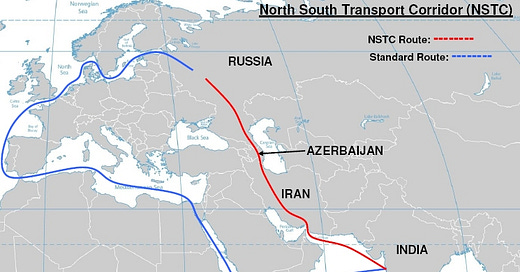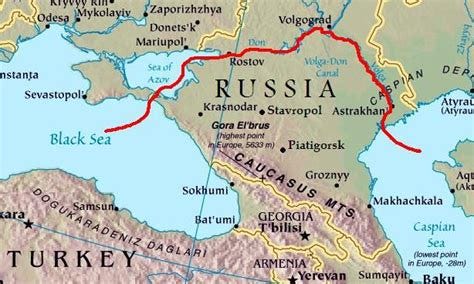In the past I’ve written at some length about the International North–South Transport Corridor, which would provide a sea - rail links stretching from Mumbai to St. Petersburg. In between, it would draw most of the Middle East and Central Asia into a vast network for international trade. But that’s only part of it, because sea links would stretch eastward to China, through South Asia. Here’s the basic idea:
Further, in combination with the North South route, Russia’s Northern Sea Route would complete a huge circle around the Mackinder “Heartland” of the world—Eurasia
—providing a sea route for Russian oil and gas to the Far East (it’s already happening—Russia is decades ahead of the US in development of the Arctic):
More recently I referred to the strategic importance of the Danube River, which empties into the Black Sea along the border of Ukraine, near the port of Odessa. If, as is widely presumed, Russia intends now to take control of that region it will become an unavoidable strategic partner for all Danube nations—a concept that extends all the way into southern Germany.
Now, here’s the kicker. What the maps above don’t show is that there is a major water link between the Caspian Sea—an important part of the North South Corridor—and the Black Sea. It’s the Volga Don Canal. Of course it works both ways, east and west. It connects the Black Sea and, through it, the entire Danube Basin to Central Asia, the Middle East, and the Far East. Thus, in addition to the pipelines already running across the Black Sea, there is now the prospect of a new, comprehensive and cost efficient trade corridor that will run throughout and around the Heartland. Another map!
All this leads up to Alex Krainer’s new substack:
Is the EU about to begin disintegrating?
Soon, "INTERMARIUM" could become a household term
Krainer is having some ironic fun here. “Intermarium” is a term that generally refers to Polish ambitions to revive a commonwealth of nations stretching from the Baltic Sea to the Black Sea, hearkening back to the Polish - Lithuanian Commonwealth’s heyday of the 16th - 17th centuries. But Krainer is suggesting that a new Intermarium, under Russian hegemony, could arise via the Danube - Black Sea and beyond trade links.
Here’s a map of that Intermarium, and it doesn’t take much imagination to realize that virtually the entirety of Europe—not just Eastern Europe—would be almost inevitably drawn into this trade relationship. It would redefine world trade:
And here’s a map that focuses simply on the Danube:
All this, says Krainer is an existential threat to the World Economic Forum’s (WEF) ambition’s of global empire. Earlier I referred to Russian hegemony in this regard. That’s true, in the sense that Russia would be the indispensable pivot to the whole network. On the other hand, Russia would be in a cooperative relationship rather than a coercive or dominating one—without the industrial might of China and India and other countries all this would be meaningless to Russia. Imagine that! International cooperation, rather than Neo-colonialism at the hands of the Globalist WEF clique:
For the Western Empire, this is the stuff of nightmares. Recall, in their December 2021 draft treaties presented to the Biden administration and NATO, Russia did set down the demands that NATO withdraw behind their pre-1997 borders. We shouldn’t assume that these were just idle clauses to haggle over.
As new realities dawn and become more discernible to western power centers, the consequences will begin to unfold in currency and bonds markets. As I wrote previously, I expect that the euro will be among the first casualties of these events. Interest rates will skyrocket and wage- and commodity- price inflation will follow, sealing the fate of the dysfunctional old political structures.
Sooner or later people in the United States will begin to re-imagine America’s global relationship. America has opportunities in abundance, but that will almost certainly entail turning from the Old World to the New.









Thank you for giving context to Alex Krainer’s excellent post! It's fascinating watching all this unfold. I feel sorry for my German relatives, who are all in complete denial about what is happening. The husband of one cousin votes for AfD and she accepts they have different political views, but the rest of the family judges him harshly for this.
Putin's a strategic thinker and the Danube has probably played a role in Russian thinking for a while. In particular, it probably explains the intensity of fighting over Snake Island last year. After territorial control of the Danube mouth itself, Snake Island and the largest nearby port, Odessa, are the most important elements for controlling entry and exit from the Danube.
It also raises an intriguing possibility. Russia is clearly trying to unite Russian-speaking areas, which include Odessa and Transnistria. Southern Bessarabia (aka Budjak) is the coastal part of Bessarabia, the USSR separated it from what is now Moldova in WWII. If Russia were to offer Budjak to Moldova in exchange for Transnistria, could Moldova say no? They would gain in territorial terms and having a coast would help a lot in alleviating the grinding poverty in the country. We already know Odessa is in Russia's sights, it is an historically Russian city with a large Russian population. If Odessa falls to Russia, Budjak and Snake Island become indefensible for Ukraine. If Moldova took the deal, it would move closer to Russia and away from the EU, and with Odessa and Snake Island, Russia would have effective control of the Danube's mouth, allowing it to extert a lot of pressure over Eastern Europe in aid of its efforts to change the political situation there.